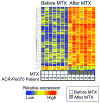Generation of novel pharmacogenomic candidates in response to methotrexate in juvenile idiopathic arthritis: correlation between gene expression and genotype
- PMID: 20827233
- PMCID: PMC2963015
- DOI: 10.1097/FPC.0b013e32833f2cd0
Generation of novel pharmacogenomic candidates in response to methotrexate in juvenile idiopathic arthritis: correlation between gene expression and genotype
Abstract
Objectives: Little is known about the mechanisms of efficacy of methotrexate (MTX) in childhood arthritis, or genetic influences upon response to MTX. The aims of this study were to use gene expression profiling to identify novel pathways/genes altered by MTX and then investigate these genes for genotype associations with response to MTX treatment.
Methods: Gene expression profiling before and after MTX treatment was performed on 11 children with juvenile idiopathic arthritis (JIA) treated with MTX, in whom response at 6 months of treatment was defined. Genes showing the most differential gene expression after the treatment were selected for single nucleotide polymorphism (SNP) genotyping. Genotype frequencies were compared between nonresponders and responders (ACR-Ped70). An independent cohort was available for validation.
Results: Gene expression profiling before and after MTX treatment revealed 1222 differentially expressed probes sets (fold change >1.7, P<0.05) and 1065 when restricted to full responder cases only. Six highly differentially expressed genes were analyzed for genetic association in response to MTX. Three SNPs in the SLC16A7 gene showed significant association with MTX response. One SNP showed validated association in an independent cohort.
Conclusion: This study is the first, to our knowledge, to evaluate gene expression profiles in children with JIA before and after MTX, and to analyze genetic variation in differentially expressed genes. We have identified a gene, which may contribute to genetic variability in MTX response in JIA, and established as proof of principle that genes that are differentially expressed at mRNA level after drug administration may also be good candidates for genetic analysis.
Conflict of interest statement
Figures





Similar articles
-
Association of the 5-aminoimidazole-4-carboxamide ribonucleotide transformylase gene with response to methotrexate in juvenile idiopathic arthritis.Ann Rheum Dis. 2011 Aug;70(8):1395-400. doi: 10.1136/ard.2010.146191. Epub 2011 Apr 22. Ann Rheum Dis. 2011. PMID: 21515602 Free PMC article. Clinical Trial.
-
Relationship Between Polymorphisms in Methotrexate Pathway Genes and Outcome of Methotrexate Treatment in a Cohort of 119 Patients with Juvenile Idiopathic Arthritis.J Rheumatol. 2017 Aug;44(8):1216-1223. doi: 10.3899/jrheum.160950. Epub 2017 Jun 1. J Rheumatol. 2017. PMID: 28572465
-
Transcriptional profiles of JIA patient blood with subsequent poor response to methotrexate.Rheumatology (Oxford). 2017 Sep 1;56(9):1542-1551. doi: 10.1093/rheumatology/kex206. Rheumatology (Oxford). 2017. PMID: 28582527 Free PMC article.
-
In the Pursuit of Methotrexate Treatment Response Biomarker in Juvenile Idiopathic Arthritis-Are We Getting Closer to Personalised Medicine?Curr Rheumatol Rep. 2017 Apr;19(4):19. doi: 10.1007/s11926-017-0646-8. Curr Rheumatol Rep. 2017. PMID: 28361333 Review.
-
Responses of patients with juvenile idiopathic arthritis to methotrexate: a genomic outlook.Expert Rev Clin Immunol. 2021 Oct;17(10):1131-1142. doi: 10.1080/1744666X.2021.1968833. Epub 2021 Aug 19. Expert Rev Clin Immunol. 2021. PMID: 34392756 Review.
Cited by
-
Gene Expression Deconvolution for Uncovering Molecular Signatures in Response to Therapy in Juvenile Idiopathic Arthritis.PLoS One. 2016 May 31;11(5):e0156055. doi: 10.1371/journal.pone.0156055. eCollection 2016. PLoS One. 2016. PMID: 27244050 Free PMC article.
-
The relationship of the immune response mediator genes’ polymorphic variants with the methotrexate efficacy in juvenile idiopathic arthritis.Turk J Med Sci. 2020 Jun 23;50(4):1038-1047. doi: 10.3906/sag-1910-96. Turk J Med Sci. 2020. PMID: 31958219 Free PMC article.
-
The interactions between monocarboxylate transporter genes MCT1, MCT2, and MCT4 and the kinetics of blood lactate production and removal after high-intensity efforts in elite males: a cross-sectional study.BMC Genomics. 2025 Feb 11;26(1):133. doi: 10.1186/s12864-025-11307-4. BMC Genomics. 2025. PMID: 39934699 Free PMC article.
-
Chromatin landscapes and genetic risk for juvenile idiopathic arthritis.Arthritis Res Ther. 2017 Mar 14;19(1):57. doi: 10.1186/s13075-017-1260-x. Arthritis Res Ther. 2017. PMID: 28288683 Free PMC article.
-
Associations Between Genetic Variants in MCT2 (rs3763980, rs995343, rs3763979) and MCT4 (rs11323780) with Blood Lactate Kinetics Before and After Supramaximal Exercise.Int J Mol Sci. 2025 Aug 14;26(16):7865. doi: 10.3390/ijms26167865. Int J Mol Sci. 2025. PMID: 40869186 Free PMC article.
References
-
- Wessels JA, Huizinga TW, Guchelaar HJ. Recent insights in the pharmacological actions of methotrexate in the treatment of rheumatoid arthritis. Rheumatology. 2008;47:249–55. - PubMed
-
- Woo P, Southwood TR, Prieur AM, Dore CJ, Grainger J, David J, et al. Randomized, placebo-controlled, crossover trial of low-dose oral methotrexate in children with extended oligoarticular or systemic arthritis. Arthritis Rheum. 2000;43:1849–57. - PubMed
-
- Ruperto N, Murray KJ, Gerloni V, Wulffraat N, Feitosa De Oliveira SK, Falcini F, et al. A randomized trial of parenteral methotrexate comparing an intermediate dose with a higher dose in children with juvenile idiopathic arthritis who failed to respond to standard doses of methotrexate. Arthritis Rheum. 2004;50:2191–201. - PubMed
-
- Nistala K, Woo P, Wedderburn LR. Juvenile Idiopathic Arthritis. In: Firestein GS, Budd RC, Harris ED, McInnes IB, Ruddy S, Sergent JS, editors. Kelley's textbook of Rheumatology. 2008.
Publication types
MeSH terms
Substances
Grants and funding
LinkOut - more resources
Full Text Sources
Medical
Molecular Biology Databases

